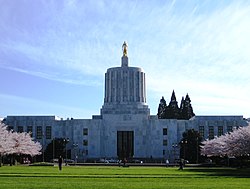| 57th Oregon Legislative Assembly | |||||
|---|---|---|---|---|---|
| |||||
 The legislature took place in the Oregon State Capitol, seen here in 2007 | |||||
| Overview | |||||
| Legislative body | Oregon Legislative Assembly | ||||
| Jurisdiction | Oregon, United States | ||||
| Meeting place | Oregon State Capitol | ||||
| Term | 1973-1974 | ||||
| Oregon State Senate | |||||
| Members | 30 Senators | ||||
| Senate President | Jason Boe | ||||
| President Pro Tempore | Richard E. Groener | ||||
| Majority Leader | Bill Holmstrom | ||||
| Minority Leader | Victor Atiyeh | ||||
| Party control | Democratic Party | ||||
| Oregon House of Representatives | |||||
| Members | 60 Representatives | ||||
| Speaker of the House | Richard Eymann | ||||
| Speaker Pro Tempore | Phil Lang | ||||
| Majority Leader | Les AuCoin | ||||
| Minority Leader | Gordon L. Macpherson | ||||
| Party control | Democratic Party | ||||
The 57th Oregon Legislative Assembly convened for its regular session from January 8 to July 6, 1973. [1] There was also a special session from January 24 to February 24, 1974. [2]
Contents
Both houses were controlled by the Democratic Party of Oregon. The House speaker was Richard Eymann. Jason Boe was the Senate president; [3] Eymann would serve as Speaker only during the 57th legislature; [4] Boe would continue as President through the 1980 special session. [5]
Republican Tom McCall was governor during the 57th legislature.
The 57th legislature passed sweeping legislation, most notably Senate Bill 100, which established a framework for land use planning in the state. [6]
Bill McCoy, the first African American elected to Oregon's legislature, served his first term in the House during this session. He was later appointed to the Oregon Senate.